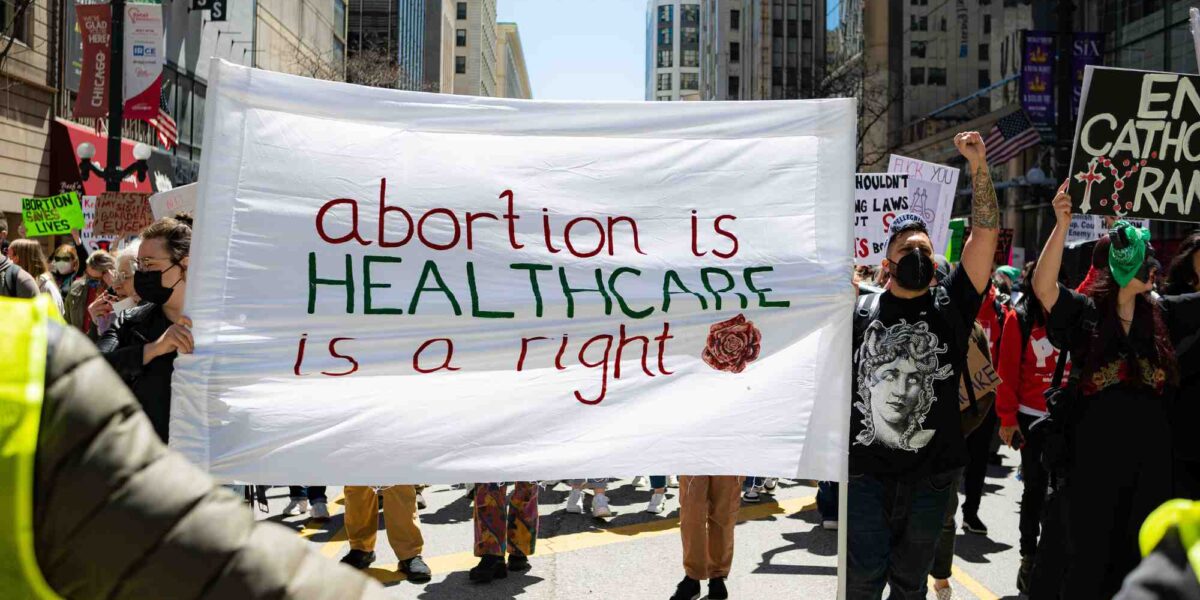On June 24, 2022, the world watched in horror as the clock turned back decades in the U.S. in real-time as the Supreme Court overturned the Constitutional right to abortion access.
The move returned the right to abortion to the state level, overruling two landmark cases — Roe v. Wade (1973) and Planned Parenthood v. Casey (1992).
While the criminalization of reproductive rights in the U.S. has been a cause for concern north of the border, experts like Martha Paynter, author of Abortion to Abolition: Reproductive Health and Justice in Canada, have sought to dispel misconceptions about abortion access in our country.
For example, access to abortion is included in the Canada Health Act and part of the country’s public health-care system.
In Canada, pregnant people can access medication abortions and aspiration surgical abortions. How accessible those options are is another story.
LISTEN NOW: Stephen’s interview with Martha Paynter
Clients in rural areas may have to travel long distances to access surgical abortions — a service Paynter described as “a 10-minute procedure that can be done by family doctors with minimal anaesthetic.”
Threats to abortion in Canadian legislature
The current Canadian government, led by self-professed feminist Prime Minister Justin Trudeau, has remained steadfastly in support of reproductive rights, promoting the right to abortion on an international scale.
“With attacks on reproductive rights around the world, it’s really important that we not take things for granted — that we continue to stand up unequivocally,” Trudeau said in an April 22 Twitter video. “This government will never tell a woman what to do with her body, we are unequivocally and proudly pro-choice and always will be.”
But the support of the Liberal Party has not stopped right-wing rhetoric around criminalizing reproductive rights from rearing its ugly head in Canadian politics.
In May, Evelyn Lazare wrote about Conservative MP Cathay Wagnatall’s private members’ bill C-311, which would create an “aggravating circumstance” clause in the Criminal Code to enforce stricter sentences for those who physically harm a pregnant person.
The bill was defeated by the House of Commons by a vote of 113-205 on June 14 after its second reading.
The Abortion Rights Coalition of Canada (ARCC) had vehemently opposed the bill — calling it “redundant” and arguing the anti-choice movement had used the legislation “as a vehicle to advance fetal rights and attack abortion rights.”
Let’s be clear: The opposition to Bill C-311 was not about the fact that pregnancies should be considered when pregnant people are victims of physical crime. But the Criminal Code already has clauses that cover pregnant victims.
The coalition has called for stronger measures to address gender-based violence, noting the bill had received support solely from anti-choice groups — with no endorsements from a single anti-violence organization.
Anti-choice record of federal political leaders
While Trudeau has steadfastly remained an outspoken supporter of reproductive rights, the leader of the Conservative Party of Canada Pierre Poilievre has remained tight-lipped when it comes to the topic of abortion.
Even among other opposition leaders — the NDP’s Jagmeet Singh, the Green’s Elizabeth May and Jonathan Pedneault, and the Bloc Quebecois’ Yves-Francois Blanchet — access to abortion is considered a nonpartisan issue that each party steadfastly supports.
That coalescence of federal parties makes Poilievre’s silence on the topic all the more concerning.
He has recently claimed to be pro-choice, but while Poilievre was running for the Conservative Party leadership in July 2022, Joyce Arthur of ARCC wrote for rabble.ca that her organization has always rated the career politician as anti-choice.
“In sum, voters should not trust Poilievre’s convenient flip-flop on his abortion views,” Arthur wrote.
Noting that a Prime Minister Poilievre would allow free votes on legislation related to abortion, Arthur also expressed concern that he could end the Liberals’ Sexual and Reproductive Health Fund.
Misinformation about access to abortion
On Tuesday, Wellness Within Nova Scotia issued a call to the provincial government to combat misinformation about abortion care and other reproductive services.
The health and justice organization pointed to Crisis Pregnancy Centres (CPCs) as a leading proponent of misleading and false information about abortions.
According to Wellness Within, CPCs are unlicensed pregnancy counselling centres — often affiliated with religious causes — that promote their business as a full-service health centre in an effort to conceal an anti-abortion agenda.
“When individuals go to these clinics, they believe they are being counselled on their reproductive options but the services they receive are biased and trying to dissuade them from having an abortion,” the organization wrote in their call to the government.
Wellness Within is also following in the footsteps of the ARCC in calling for regulations for CPCs, arguing they should be legally required to disclose their anti-choice and religious stances to prospective clients, be prohibited from misleading advertising and teaching sex education in public schools, and have charitable tax statuses revoked when applicable.
Additionally, the organizations say CPCs should no longer be able to provide unregulated medical services like ultrasounds, and that they should not be included on referral lists by legitimate medical facilities.



